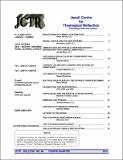JCTR Bulletin 4th Quarter 2010

View/
Date
2010Author
Jesuit Centre for Theological Reflection
Type
BulletinLanguage
enItem Usage Stats
40
views
views
29
downloads
downloads
Abstract
The fourth quarter in Zambia, since 2009, is occupied with discussions of the National Budget and how
Government is going to implement its programmes in the coming year. It is worth noting that before then Budget
discussions used to take place in the first quarter of the fiscal year. It was interesting that both in the Budget
Speech by the Minister of Finance and National Planning and the debates in Parliament, several references
were made to developing Zambia, ensuring increased economic growth, and eradicating poverty. These are
responses to development problems that Zambia and other least developed countries are facing. The problems
that most developing countries are facing are solvable. The fact that these problems are complex and
sometimes chaotic does not mean we can do nothing about them. Problems of bad governance, poverty,
disease (malaria, AIDS, cancer, TB, STIs), donor dependency, rural underdevelopment, electoral malpractices,
non-participation, disasters, and wars and tribal conflicts are all things that we can do something about.
The unique problem in most developing countries is that people in these countries often fail to see that they
are the solutions to their own problems. Instead, they want to believe that they are impotent, helpless, and that
others, often the rich, Western countries and NGOs, can solve their problems. They would go further to assert
that it is the moral obligation of the rich to solve the poor’s problems and suffering. The problem with this is that
this dependence on others solving the poor’s problems is that, no matter how hard the others try, they cannot
fully understand the problems of the poor and they often have to depend on development theories (often
developed in the West), cause-effect assumptions, and knowledge learnt from people in developing countries.
Depending on others has led to some “popular” ways and methods of solving problems that do not work. These
have included use of development aid, Structural Adjustment Programmes (SAPs), use of capacity building
workshops, a concentration on meetings and conferences, and pilot projects that do not graduate and are not
universally applied. Most responses to development problems are either imposed or a process of buying in
where even consultation is not honestly done. The rigidity of development practitioners – state or non-state –
that is exhibited in fine-tuning their approaches, is a great hindrance to development and social change.
